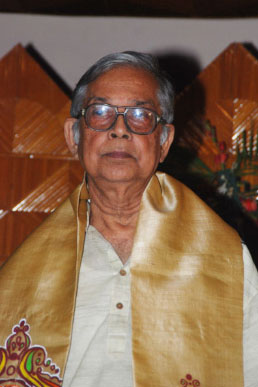
Bijit Kumar Bhattacharya is a known poet among the north eastern India’s Bengali
literary world. He was born on 7th Oct 1939 at Kastyagram in Karimganj district of
Assam. The youngest son of Ishanchandra and Shakuntala
Bhattacharya, Bijit Kumar completed his education in Bipin Chandra High School in
his home town and later in St Edmund’s college in Shillong and finally completed his
Masters from Guwahati University.
He started
his professional career in the area of Chemistry with S S College in Hailakandi,
Assam and later retired as the head of the department.
Bijit was interested
in literature since his teenage days. At the age of
just 15 when he was still a school going student, Bijit edited a literary magazine
titled ‘Tarun’. As a student of higher studies he also edited other publications
like ‘Muroj’ and ‘Mousumiraj’ in 1961-63. Later, after
starting his professional career in 1967, he edited a quarterly magazine from
‘Hailakandi Sahitya’ which in the period of its existence in more than four decades,
apart from creating several records, has also carved
a special place for itself among the little magazines of the region. In 1965, when
Bijit was doing his post graduation degree from Guwahati University, his written
play ‘Drisho Naikaar Anupastithe’ got the best play
award. Bijit has eight collection of poems published--- his first publication was in
1971 when he published his first collection of poems ‘Keu Porobashi Noye’,
thereafter ‘Jege Aache Stobdho-taaiye’, ‘Shundar Jekhane
Khela Kore’, ‘Mahabarat Kotha’ , ‘Punorbhobha’, ‘O Chele Baul Chele’, ‘Bhaalo Aachi
Shokoler Shonge Bhaalo Aachi’ and ‘Sreshto Kobita’.
Bijit Kumar’s edited
book ‘Ei Aalo Hawa Roudro’ was the first attempt to
bring the works of various poets of the North Eastern region together; jointly
edited with Shakti Chattopadhay the second edition of the collection was published
in 1981. Other books edited by him includes six volumes
of ‘Nirbachito Sahitya’ which is the collection of poems, stories, novels, articles,
etc published in the literary magazine Sahitya in various times; ‘Atondro Abong
Borak Upatyakar Bangla Kaibbo Chorcha’, ‘Silchar Sangeet
Vidyalaya Abong Borak Upatyakar Sangeet Chorcha’ and ‘Barak Upatyakay Charuklachha’.
The books on his articles in the chronological order includes ‘Surakhito
Bandhishala’, ‘Bangla Sahityo er Tritiyo Jeevan’, ‘Uttar
Purbo Bharat o e Bangla Sahityo’ in two parts, ‘Sahityo er Saathkahon’ and ‘19she
May Abong Assam e Bangalir Astitvar Shonkot’. Bijitkumar’s distinguished work
‘Bikeler Aalo’ attracted everyone’s attention and was widely
appreciated.
Bijit Kumar has received various awards for his vast literary work some of
which includes Little Magazine Award (1992) for ‘Sahitya’, Anirban award for best
editor and Barak Upatyaka Banga Sahitya o Sankritik
Sammelan instituted Jibanananda Satabarshiki Puraskar in 1999 and Rajkumar Nandi
Majumdar Smriti Padak in 2002, Sahitya Sankriti Samman O Smarak (2002) award
instituted by a Guwahati based magazine ‘Eka Abong Koyakjon’
and Sahitya Setu Award in Kolkata in 2006. Besides, he has also been invited as a
lecturer on various occasions in Guwahati, Assam and Delhi universities.
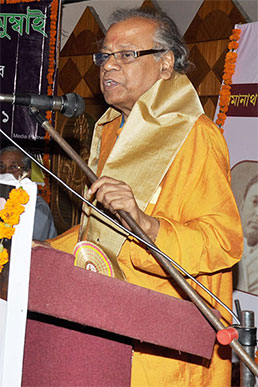
At merely 20 years of age, Pabitra Mukhopadhyay stunned everyone by his poem ‘Darpane
Onek Mukh’ published in distinguished magazine Signet. Next year in 1961 his work
‘Shabyatra’ was published which was not only a long
poem but was termed as a ‘great’ poem adding his work to a rare feat for which he
remains special till date. Pabitra was born on 12th December 1940 at Adhuna in
Borishal district in erstwhile East Bengal (today’s Bangladesh).
His parent’s names were Rohinikanta and Jogmaya Mukhopadhyay. Pabitra lost his
mother at an early age and was brought up by his aunt (mother’s sister). He later
migrated to West Bengal facing great financial dearth
making him live a life of struggle and hardship. He financed his own education by
taking tuitions. During his college days he worked in the library of Bhawanipur
South Suburban School where later he also served as a
teacher. After completing his masters, he joined Vidyanagar College.
Pabitra started unique literary magazine Little Magazine during his student life
which he ran for more than 50 years. He has changed himself
with various experiences in life which reflected in his writings leading to his
creation of ‘Shabyatra’ along with few other remarkable poems like ‘Iblisher
Atmadarshan’ (which is later translated as ‘Iblish Confronts
Himself’ by Leela Roy), ‘Bijuktir Shedrakto’ (1972), ‘Aloker Upakhyan’ ( 1982),
‘Parshuram Parba’ (1994), ‘Jatugrihe Aachi’ (2009). Pabitra is equally competent in
writing sonnets.
Pabitra started a revolution
in writing called ‘Third Literature revolution’ in the 80s when he penned down
experimental poems which he believes should reflect common man’s thoughts and ideas
hit the minds of the readers making them feel that the
poem reflects the reader’s own thoughts, ideas and feelings.
Among the
various books published of his poems, some of the remarkable ones are ‘Hemanter
Sonnet’ (1961), ‘Aguner Bashinda’ (1967), ‘Drohhim Aamar
Dinguli’ (1982), ‘Bharbahider Gaan’ (1983), ‘Aami Tomader Shonge Aachi’ (1985),
‘Aachi Preme’, Bishade, Biplobe (1987), ‘Arogyabhumir Dike’ (1994), ‘Bish Noye
Uteche Amrit’ (1999), ‘Shondhikhone Aachi’ (2001), ‘Shona
Swapnavhuk Shona’ (2005), ‘Aami Bhutgrasto Kobhi’ (2007), ‘Aagune Shoinnashe Aachi’
( 2005), ‘Chena Path Ondhokar’ ( 2010), ‘Socheton Shopnochaari’ ( 2011) etc.. His
remarkable books on prose include ‘Bichinna Abhichinna’
(1974), ‘Kabir Kaaj O Onyoonno Prabandha’ (1981), ‘Surjokarojjal Jeevananando’
(1999), ‘Sattar Samrajyo O Kabita’ (2000), ‘Kabir Desh, Kabitar Desh’ (2009), and an
autobiography titled ‘Drohipurush’ (2009) etc..
Pabitra has received several
awards including Jivananando Puraskar, Satyendranath Dutta Puraskar, Shilindhro
Puraskar, Padmaganga Puraskar, Bharatchandro Puraskar, Tarashankar Bibhuti Puraskar,
Chokh Puraskar, Aami
Puraskar and Rabindra Puraskar. Besides, he also received special honours from West
Bengal Academy and Kolkata University.
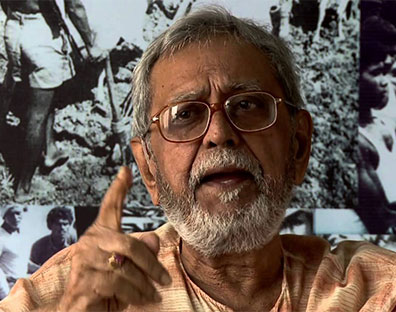
Though, Tarun Sanyal was associated with various social, cultural and political
organizations in diverse roles for a long period of time, but his identity as a poet
supersedes all. He started his career as a poet in the
same year of Indian Independence when his first poem ‘Ramdhenu’ was published at his
early age of 15 years in a youth newspaper; and even till date his unique creation
is undeterred.
Tarun Sanyal was born on
29th October 1932 at Porjona, Shahjadpur in Pabna district (present Bagladesh) to
lawyer father Ashwani Kumar Sanyal and Hirenmoyi Devi. Besides Porjona, Tarun spent
his childhood and youth in Bakura, Rajshahi, Burdhman
district and Kolkata. After completing his masters in Economics from Calcutta
University in 1956 he joined for a few months Balurghat College in North Bengal as a
lecturer before finally joining Scottish Church College
in Kolkata in 1958. He finally retired from the same college as Vice Principal in
1998.
Sanyal from his student life, apart from taking keen interest in
culture and literature, as a responsible citizen, got
himself associated with various social and political movements. At the age of ten,
he was hurt while participating in a mass movement in Bakura. While Sanyal was in
his late teens he was arrested under preventive detention
and was lodged secretly in Vardhman district jail; later quite a few number of times
he was also detained as a political prisoner. He also actively participated in the
1959 Food Movement. As a supporter of communism
young Sanyal, while on one end participated in active campaigning for the United
Front from 1967-69, on the other hand, he also took an active part in Bangladesh’s
movement for independence in 1971-72 which included
providing food and safe shelter for the various intellectuals involved in the
movement. He was the convener for Socialistic Co-operative Society and editor of
Indo-Soviet Co-operative Society (1972-81). Though in 1981,
he severed his ties with an important political party, though later, he took active
participation in various movements involving education, health, culture &
literature, play and films.
Tarun Sanyal’s first
collection of poems ‘Maatir Behala’ was published in 1956. Till now he has to his
credit 26 books of his poetries. His latest two collections of poems are titled as
‘Baukudanir Brahmodanga’ (2009) and ‘Haath Bhora Fuler
Golpo’ (2010). ‘Sarveshori Sabdeshori’, ‘Moriomer Meera’, ‘Achin Pakhir Eka’,
‘Santrashe Sanglape’ etc are some of his remarkable collections of poems. Besides,
‘Sreshto Kabita’ , ‘Kabita Sangraha’ in two parts and
‘Kabita Samagraha’ in third and fourth parts are some of his other collection of
poems worth mentioning.
Sanyal has written 42 poetic dramas out of which 35
creations have been published. He has translated
three books on poetry and has edited four books on collection of poems. The names of
newspapers with which Sanyal has been associated as an editor are mouthpiece of
students union of Kolkata University ‘Ekta’ (1955),
‘Kabipatra’ (jointly, 1958), ‘Seemanto’ (1962-1967), Parichay (jointly, 1967-75),
Rus-Bharati (1972-81).
The list of awards that Sanyal has received for his
literary work in five decades include Ultoroth Puraskar
(1971), Bishnu Dey Smarak Samman, Rammohan Samman, Bangabandhu, Mangalacharan
Chattopadhay Awards. Besides, he has received 20 other awards including Bharatbhasha
Bhushan Samman(1995), Rabindra Smriti Puraskar (2006),
Bangladesh Muktijodhha Samman (2012) among others.
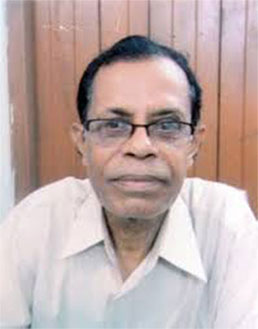
He started writing poems from his student life. He was only 21 years old when his
first collection of poems ‘Neel Akash: Pakhi’ was published. While Little Magazine
has been the platform for many novice poets, but Swapan’s
first collection of poems was published even before his poems appeared in the said
magazine, however, later when his creation ‘Nandimukh’ appeared in Little Magazine,
it not only lead to a sensation in his home state
of Tripura or the North east India but in all the other magazine/newspapers on
Bengali literature across India.
Swapan Sengupa was born on 2nd December
1945. He studied literature in Maharaja Veerbikram College
in Agartala and finally did his PhD on the same subject. In his student life,
besides writing poetry he also edited his College’s mouthpiece ‘Prachi’. Two years
after publishing his first collection of poems, under
his own editorship, his creation ‘Nandimukh’ was published. However, the poet’s
second collection ‘E Aamar Bhikiri Haath Noye’ was published after a long break in
1985. In the same year, another collection of the poet
‘Lal Ghashe Neel Ghoda’ was also published. Besides writing poems, he also got
himself associated with the Bengali literary world of the North Eastern part India.
In 1973, under his editorship ‘Dwadsh Ashwarohi’ was
published which has poems of 12 eminent poets from Tripura. Dasgupta also edited
‘Ganga Gomti’ published in 1983 which has poems penned by poets from Tripura and
West Bengal. Two more books on poems were published under
his editorship which includes ‘Uttar Purbanchaler Bangla Kabita’ in 1999 and
‘Anangomohini Devir Kabita O Kabyalochana’
Dasgupta’s five collection of
poems published since 2000 include ‘Dhulomakha Pidite Ekaki’,
‘Jugolbandhi Toofan’, ‘Dohon O Jalstar’, Kabita Shamgrah-1’ and ‘Harano Dheu Er
Jolpai Shish’. His research book ‘Panchasher Manmantar O Bangla Kabita’ was
published in 2004, besides a prose book ‘Shanirbachito Lekhalekhi’
in 2006.
Though Swapan made a unique identity by his poetry, but he was
equally versed in writing prose. Numerous articles on poetries written by him were
published in Little Magazine and various other journals
and magazines.
His poems were selected in ‘Bishwa Bangla Kavita Sankalan’
and Penguin Book’s ‘Dancing Earth’.
The list of awards which have been
bestowed on the poet till now includes Bangla Kavi Sammelan’s
Samvardhana (1972), Tripura Govt’s Kavi Sukanta Smiriti Puraskar (2006), Rabindra
Parishad’s Bijonkrishna Debbarman Smriti Puraskar (2007), Tripura Govt’s Kavi Salil
Krishna Debbarman Smriti Puraskar (2011).
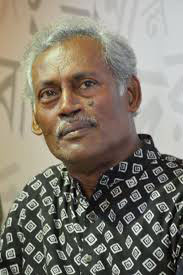
Shyamalkanti Das was born on 3rd November 1951 in a remote village of undivided
Medinipur in West Bengal. His parent’s names were Purushottamprasad and Shefali Das.
Das completed his schooling from Vishnupriya Primary School,
Rajnagar Higher secondary School followed by his college studies in Mahishadal Raj
College and pursued his higher studies in Rabindrabharati University. He started his
professional career with monthly magazine ‘Krittibas’
edited by Sunil Gangopadhyay. He also worked for some time as a teacher in a
secondary school. Later, he also contributed for Anandabazar Patrika.
After
spending 25 years in journalism, in 2004, under his editorship
a monthly magazine on poetry ‘Kabir Kagaj Kabitar Kagaj’ was published. Due to Das’s
vision and able management the magazine has evolved over the period of time and has
become popular among the readers. Meanwhile, he
also got associated with Sunil Gangopadhyay edited magazine ‘Chiro Shabuj Lekha’ and
worked for three years there.
‘Aai To Aamar Mon’ was Das’s first poem to be
published in a magazine called ‘Patshala’. His
first collection of poems ‘Kagajkuchi’ was published in 1976. 35 books on his poems
have been published which also includes poetries for children. Some of his
remarkable collection of poems include ‘Kagajkuchi’, ‘Premer
Kabita’, ‘Bhuter Charane’, ‘Amader Kabijonmo’, ‘Saral Kabita’, ‘Chhoto Shohorer
Kabita’, ‘Door Theke Likhi’, ‘Bokha Meyer Jonno’, ‘Chole Jaai Din’, ‘Pulkito
Yamini’, ‘Akela Pagal’ among others. Das’s writings has also
found readers in Bangladesh and some of his books have been published from the
neighbouring country too, which includes ‘Sha-nirbachita Kabita’, ‘Bandhur Mokhosh
Bandhu’, ‘Bheshe Bedabaar Anando’ , ‘Jhupshi Didir Gaaner
Badi’, ‘Priyo 100 Kabita’ and ‘Dhaani Patka’.
Some of his collection of
poems for children includes ‘Babuibabu’, ‘Chaaichi Ghudi Manjha Shuto’, ‘Patai Moda
Baashi’, ‘Paakhi Shob Kore Robo’, ‘Baagher Gaaye Holde
Jaama’, ‘Shreshto Chhoda’ and published from Bangladesh ‘Aampata Jaampata’ and ‘Mone
Kor Ghumiye Aachish’.
Das has also worked as an editor for various
publications which includes ‘Kavisammelan’, ‘Pratiti’,
‘Janapadh’, ‘Kabita Samvad’, ‘Concert’ and ‘Atmaj’. Besides, he has also edited
various books which includes ‘Haajar Kabir Haajar Kabita’, Lekhak Satyajit Rai’,
‘Aaladde Aaatkano’, ‘Dui Banglar Praner Kabita’ among
others. Das has also been associated with various institutes related to poets, as
President or editor- in-General, some of which includes ‘Saara Bharat Kabita Utsav’,
‘Bishwa Bangla Kabita Utsav’, ‘Saara Bangla Shishu
Sahitya Utsav’, Saara Bangla Tarun Lekhak Sammelan’, etc..
For his illustrious career in literature, Das has been adorned with several
awards including Jibananando Puraskar, Bishu De Puraskar, Sahitya Setu Puraskar,
Tushar Rai Puraskar, Kishor Bharti Patrika instituted
Sadhna Chattopadhyay Puraskar among many others. In 2009, Das was honoured with Govt
of India’s ‘Jatiyo Kabir Samman’.
Das’s poems have also been translated in
various Indian and foreign languages.
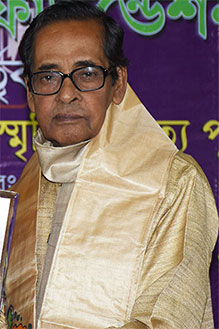
Ratneshwar Hajra was born in the village of Bharatkati in Borisal district (Present
Bangladesh) in undivided India in the year 1937. He lost his father at an early age
of 12 following which he lost interest in studies.
After the riots of 1946-47, he shifted to Kolkata to his relative’s place where he
made his new beginning in life. After completing his school education, he started to
learn motor mechanism in pursuit of livelihood
but did not find success in it. After completing his graduation from Ashutosh
college from Kolkata, he joined a job under West Bengal Govt from where he retired.
He showed inclination towards poetry from his
college days. Besides Little Magazine, his poems were also published in reputed
magazines like ‘Bharatbarsha’, ‘Tarun er Shopno’, etc.. His first collection of
poems ‘Vishonno Hritu’ was published in 1962. Thereafter
his other collection of poems was published one by one which included ‘Lokayat
Aloukik’, ‘Jalvayu’, ‘Gatkal’, ‘Aaj Abong Aami’, ‘Aidike Dakhin’, ‘Raaji Aachi’,
‘Uppataka Eka’, ‘Shekhano Chhobigulo’, ‘Dhulosnan’ etc..
He has also written collection of poems for children some of which includes ‘Megher
Dida Barafdana’, ‘Ratnamalar Jaadugar’, Maatir Ghoda Shopno Bhora’, ‘Alikpur Ektu
Door’, etc.. He also translated Jaidev’s ‘Geet Gobindo’
and Kalidasa’s ‘Hritusanhar’.
The poet has received several awards including
‘Raigunakar Bharatchandra Smriti Puraskar’, West Bengal Academy instituted ‘Abhigyan
Puraskar’, ‘Mahadiganta Puraskar’, ‘Manjush Dasgupta
Smriti Sammanana’, ‘Shishu Sahitya Puraskar’, etc..
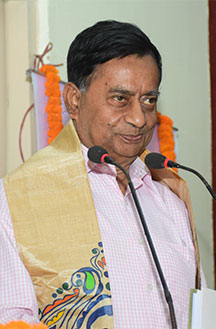
Born in 1943, Udayan passed his childhood, adolescence and youth shifting across
various places of NE Region including Imphal, Silchar, Guwahati and Shillong. Udayan
started writing poetry from his childhood days and later
even wrote essays and did translations. He passed his professional life at Shillong
as a lecturer of Physics in Shillong college. He also did some research work under
the guidance of noted scientists like Dr Kishorimohan
Pathak and Dr Paraskumar Choudhury.
Now residing in Kolkata, Udayan was one
of the editors of Silchar’s famous poetic journal ‘Otondro’ for 19 years. Wherever
he stays, Udayan finds pleasure discussing on literature
with his near ones. He was also associated with Marxism politics.
Udayan has
translated in English a collection of poems from all the languages of North East
which is going to be published from Sahitya Academy.
Some of Udayan’s translations was included in one of Penguin’s collections.
Some of his work which has been published till date includes ‘Jhop Jungoler Kabita’,
‘Sreshto Kabita’, Kamalkumar Bodhini-1’ ‘Harishchandra
(Bonsai Novel) and ‘Communist Manifesto er Dersho Bochor’. Some of his works which
are awaiting publication includes ‘Orchid Upatakyar Bhalobashar Gaan’, ‘Naga Paharer
Gaan’, ‘Pointillist er Atmakatha’, ‘Kamalkumar
Bodhini-2’, ‘Udo Kobitar Jhudo Phool’; poetic drama including ‘Rakhto Sinhasan’ and
‘Blackhole Radiation’; collection of essays including ‘Ekotha, Okotha, Matkotha’ and
‘Solomoner Gaan’.
Udayan also received
token of appreciation from Hailakandi’s newspaper ‘Sahitya’ in 2007.
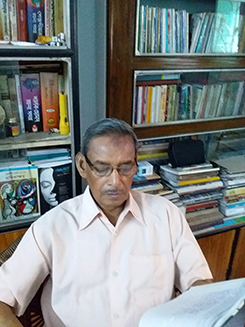
Poet Ajit Bairi was born in 1945 at Kanakpur Village in Hubli district. He composed
his first poem at his school hostel in the midnight under a lantern in the memory of
his late mother who had died prematurely. In his adolescence,
he started working as a messenger in a factory; later he also worked as an
accountant at Howrah station maintaining stock of the ration brought the porters.
He joined the state government service in 1971. He
retired in 2008 as Deputy Project Incharge of West Bengal Government’s Sunderban
Development Board. During the Naxalite Movement Ajit Bairi had to face police
harassment for providing safe abode to Poet and Journalist
Jyotirmoy Dutta.
Over a period of time Bairi’s various works were published
which included 26 collections of poems, two novels, one collection of stories, one
book on review of popular poems, one book on his
autobiography and seven other books which includes collections of poems by two
Bengali poets and edited compilation of other poems.
Few of his worth
mentioning collection of poems are ‘Rad-er Maati’, ‘Dakhiner
Nona Maati’, ‘Bidaaye Kobhalam Bidaaye Surjaosto’, ‘Prijonvyaan Abong Kaalpurush’,
‘Haritaki Boner Rodh’, ‘Sandhyatarar Moto Meyeti’, ‘Aaguner Chaador’, ‘Shobder
Terakota’, ‘Dhulotheke Tule Nebo Stob’, ‘Paribrajker
Jhuli’, ‘Ardhek Aakash Tumi’, ‘Sreshto Kabita’, etc. His edited magazines include
Pratimukh ( 1980-1986) and Kritika (2008- 2010)
In Poet and essayist
Tapankumar Maiti’s edited book ‘Sirjon Nadir Kobi- Ajit
Bairi’, many literary experts including teacher Asitkumar Bandhopadhyay, Nilratan
Sen, Parthapratim Bandhopadhyay, Sumita Chakraborty, Krishna Dhar, Tarun Sanyal
evaluated his poems.
Besides a poet, Bairi is
also an agriculture expert. Catering to his professional demand, he travelled around
the forests of Sundarban where he taught the farmers how to cultivate in a salty
land.
Piyush Raut is a unique name in the Bangla literary world of the north eastern part
of India. He was born in 1940 in Sylet district of East Bengal in undivided India.
His first collection of poems ‘Bishonno Udyane Boishak’
was published in 1990. He started writing poems when he was a student. At the age of
23, he edited a magazine on poems. Tripura’s first magazine on poems ‘Jonaki’ was
published under his supervision in 1963 till the
year 1977. Besides he was also editor of Tripura’s first magazine on stories ‘Sopno
Abong Dukkho Sopno’ from 1969-74. Simultaneously, he edited both the magazines.
Besides, he also edited other magazines which include
‘Khowai’, ‘Oronyo Aamra’ and ‘Sabinay Nivedan’. Piyush Raut started writing poems as
a result of some personal incidents in his life. His poems portray the problems of
common men, their hardships and their anger. Besides,
his poems also deal with love and how to live a meaningful social life.
Piyush Raut is also a socialist poet. His poem talks about social awakening in a
very smooth and natural way. His poem does not merely
depict the love between a man and woman or describe any physical appearance, but
tells something which leaves a mark in reader’s mind.
Piyush Raut’s
published collection of poems include ‘Bishonno Udyane’,
‘Jonmo Juaari’, ‘Noshto Ashhiner Megh’, ‘Priyo Kontoshore Uchharito Panktimala’,
‘Oboshorer Aage O pore’, ‘Mantraputo Rumal’, ‘Sir-Apnar Telephone’, ‘Torsha Series’,
‘Srichoroneshu Baba’, Chinikom, ‘Hello Chief Minister’,
‘Jai He’, ‘Aamra Koekjan’, ‘Aamar Onukobita’, ‘Jonaki Shomgroh’ and ‘Iti
Tomari’.
Raut has tried and tested in writing short stories. This is evident
from his book ‘Aruner Atmashomikha O Onyanno Golpo’. He has
also penned an autobiography ‘Aamar Kobijibon’.
In his illustrious career
span as a poet, Piyush Raut garnered several awards/appreciations. Some of his
noteworthy appreciations/awards are West Bengal Govt’s
Kavita Utsav Sambardhana, Tripura’s Uttar Purbanchaliya Sahiyta Sammelan
Sambardhana, Sahitya Setu Puraskar, Tripura Govt’s Kavi Sukanta Puraskar, Prabah
Sahitya Samman, Nandini Smriti Sahitya Samman, Nandito Priyajan
Samman, Silchar’s Barakvarta’s Kaviratna Samman among others.
His poems have
been published in almost all major Bangla magazines including Desh, Kritibash,
Pratikshan, Kavisammelan, etc.
Born in northern part of West Bengal, Ranajit Das has earned recognition as a Bangla
poet in India. Ranajit Das was born in Silchar, Assam in 1949. After completing his
graduation in science from Guwahati University, Das
moved to Kolkata. There he cleared civil services examination and joined the state
government. After taking voluntary retirement in 2006, Das has been living with his
wife and son in Kolkata. Das is a passionate about
football, besides he also takes keen interest in films. Philosophy is Das’s
favourite subject. Eleven collections of poems written by Das has been published
till now; which include Amador Lajuk Kabita (1977), Gypsyder
Tanbu (1984), Samay, Sabuj Daini (1987), Bandorer Kathyabhasha (1993), Ishwarer
Chokh (1999), Sandhhyar Pagol (2004), Samudra Sanglap (2007), Shahare Nistabdha Megh
(2010), Dhankhete Brishtir Kabita (2013), Asamapto
Alingan (2016), Bishadsindhur Kichhu Leha (2018). Besides, Das has written two
novels Biyogparba (1997) and Shyamapoka (2000). Ranajit Das has also written two
collection of essays on literature Khnopar Phul Bishayak
and Kabitar Dwimerubishwa.
A collection of English translation of Das’s poems named ‘A Summer Nightmare
and Other Poems’ was published by Rupa & Co in 2011.
Under his editorship, a
huge collection of poems named ‘Bangladesher Shreshta
Kavita’ was published in 2009 from Bangladesh.
He received various awards
among which a few noteworthy are Rabindra Chattopadhyay Memorial Award, West Bengal
Bangla Academy Award and Rabindra Award. He has recited
poems in various national and international Poet’s conferences. Under Indo-Croatia
Cultural Exchange Program, Das visited Croatia in 2012.
Son of Kiranchandra and Ashalata, Kalikrishna Guha was born in 1943 at Chhaibadiya
village in Faridpur district (presently Rajbari) of Bangladesh in undivided India.
Due to Partition of India and early demise of his father
Kalikrishna Guha’s childhood days passed in uncertainty. After studying till class 5
in his home village, Guha shifted to Rajbari city at his aunt’s place and studied
there for two years in Goalanda High School. Later,
in 1957 Guha shifted to Kolkata which became his permanent abode.Guha started his
professional career as a clerk in West Bengal govt in 1965. After some time he
passed the civil services examination and joined WBCS
in the state govt. A graduate in arts and law, he performed his duty as a bureaucrat
efficiently before taking retirement in 2002.
Guha’s life as a poet started
in 1960s when he was in college. Guha’s first
collection of poems ‘Raktatta Badir Pashe’ was published in 1967. Till now the
number of Guha’s published collection of poems stands at 25; besides he has two
drama poems, one collection of stories and five books on
various other topics. In 2008, Dey’s Publishing published Guha’s ‘Shreshta Kavita’ .
The difference between publication of his first and second collections of poems
(Nirbashan Naam Daknam, 1972) was five years, after
which in every decade Guha’s 2-3 books have been published.
Kalikrishna’s
noteworthy list of works include ‘Hey Nidrahin’ (1988), ‘Ontorer Proshno Jodito’
(1991), ‘Khondito Shei Surjouday’ (1994), ‘Akshayboter
Desh Paar Hoi’ (1997), ;Gotojonmer Srinmokal’ (2001), ‘Opar Je Bismoron’ (2006),
‘Molin Patgrahan’ ( 2010), ‘Malcomjir Ghat’ (2013). Samprit Publishing House’s
published collection of poems include ‘Barita Andhokar
Hoyeaache’, ‘Astomita Panahar’, ‘Tomar Anupasthithir Pashe’, ‘Ai Bichoron Bhumi’.
Besides, prose published by the same publishing house includes ‘Gotojonmer Kotha’,
‘Aasha Jaawar Pother Dhaare’, ‘Hemanta Aayojito Paat’
(Essays), ‘Akshayboter Desh (Essays) and ‘Pipulgachtheke Parimal Shomer Proshno O
Nirobota’ (Story Collection).
Living a simple life, Kaliskrishna Guha is
benevolent person. Guha is an atheist who believes nature
is the supreme creator. For him spiritualism and rationalism lies in universal
nature. Guha has immense faith in Rabindranath Tagore. He believes Tagore’s work is
a treasure trove of poem and music. Guha believes every
writer or artist should have enough pride to defend his work but at the same time a
writer should also abstain from any prejudice while writing anything critical
intending for any political or social awakening. His
work was appreciated in various literary journals.
© 2017 All Rights Reserved. Design by Goyal Infotech